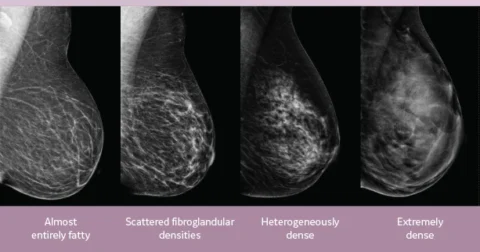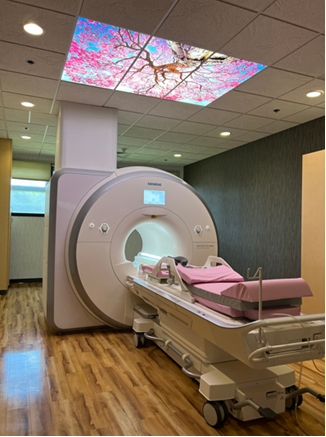Intermountain Medical Imaging is the First in the Valley to Offer Abbreviated Breast MRI
Abbreviated MRI also called “AB-MRI” or FAST MRI is a shortened version of a breast MRI that is designed to screen for additional breast cancers not seen on other imaging such as mammography or ultrasound. It detects biologically aggressive invasive cancers at early stages.
Abbreviated Breast MRI is an examination of the breast that detects small cancers that standard mammography does not see. It is NOT a replacement for annual mammogram screenings. Studies show that an AB-MRI examination in conjunction with a mammogram can find more cancers in women with dense breast than mammography alone. This is a painless examination that takes less than 30 minutes to complete and has no radiation or compression.
Dense Breasts May Benefit Most from Abbreviated Breast MRI

Breasts are considered “dense” if they have more fibrous or glandular tissue and less fatty tissue. While the condition is normal and very common, it can make it harder to pick up small tumors on screening mammograms. Having dense breast tissue may also increase the risk of breast cancer.

Intermountain Medical Imaging now offers abbreviated breast MRI to detect breast cancer in women considered at average risk. The procedure has a higher cancer detection rate than 3-D screening mammograms alone.
Benefits of Abbreviated Breast MRI:
There are several benefits of an abbreviated breast MRI.
- Abbreviated MRI scans are about 10 minutes. A traditional MRI can take up to 45 minutes.
- It offers a higher cancer detection rate for average-risk patients and can identify extremely small cancers that cannot be found with 3D mammography or ultrasound alone.
- Our MRI scanner is larger in size, allowing for additional comfort for all body types. It’s relatively comfortable and requires no patient prep. Patients lie face down and move through a large bore MRI machine for this exam.
- The out-of-pocket cost of $350, collected at the time of service, and is less expensive than a traditional MRI when not covered by insurance.
FREQUENTLY ASKED QUESTIONS:
Who is recommended to get an Abbreviated Breast MRI?
Women with heterogeneously dense and extremely dense breast tissue benefit most from additional MRI screening.
If I get a 3D mammogram, do I also need to get an Abbreviated Breast MRI?
AB- MRI is meant to be complementary to a mammogram and should not be used to replace your annual screening mammogram.
Does an Abbreviated Breast MRI see different information than 3D mammography?
Yes, MRI and mammography use different technologies to detect breast cancer. For example, calcifications (potential early stage of breast cancer) can only be seen on your mammogram, while it is easier to spot masses in women with extremely dense breast tissue using MRI.
Can I alternate abbreviated breast MRI and 3D mammograms?
IMI recommends annual mammography. There are no national guidelines for AB-MRI at this time. We recommend discussing with your doctor to decide if an abbreviated breast MRI is needed in conjunction with your annual mammogram for breast cancer screening.
Additional screening options for dense breasts: see ABUS
WHAT TO EXPECT:
If you are claustrophobic (fearful of small, enclosed areas) or experience pain when lying on your front, please let us know so we can make sure you have what you need to complete your exam successfully.
Unless you are told otherwise, take all additional medications as usual.
Please leave your jewelry and valuables at home.
You will be asked to wear a gown and scrub bottoms during the exam.
Please tell the technologist, radiology nurse and/or radiologist of any allergies you may have and if you are pregnant or nursing.
You will be asked to fill out a questionnaire that will determine if an MRI is safe for you. People with various implants (usually metallic), body piercings, or metal in their bodies (including some tattoos) may have difficulty with an MRI – which utilizes a strong magnetic field. The imaging team needs to be informed of any of these potential problems.
You will get a thorough explanation of the procedure, and we will answer any questions you may have before you are asked to sign your consent form for the exam.
There are no restrictions placed upon you. You may eat or drive as normal. It is only necessary to have a driver if your referring doctor prescribed sedation medication for this exam.
A radiologist will examine your images, and your report will be sent to your healthcare provider within 24-48 hours. Your healthcare provider can review these results with you. You may also get a copy of your report through the IMI patient portal.
Additional screening options for dense breasts: see ABUS
There are no restrictions placed upon you. You may eat or drive as normal. It is only necessary to have a driver if your referring doctor prescribed sedation medication for this exam.
A radiologist will examine your images, and your report will be sent to your healthcare provider within 24-48 hours. Your healthcare provider can review these results with you. You may also get a copy of your report through the IMI patient portal.
Additional screening options for dense breasts: see ABUS